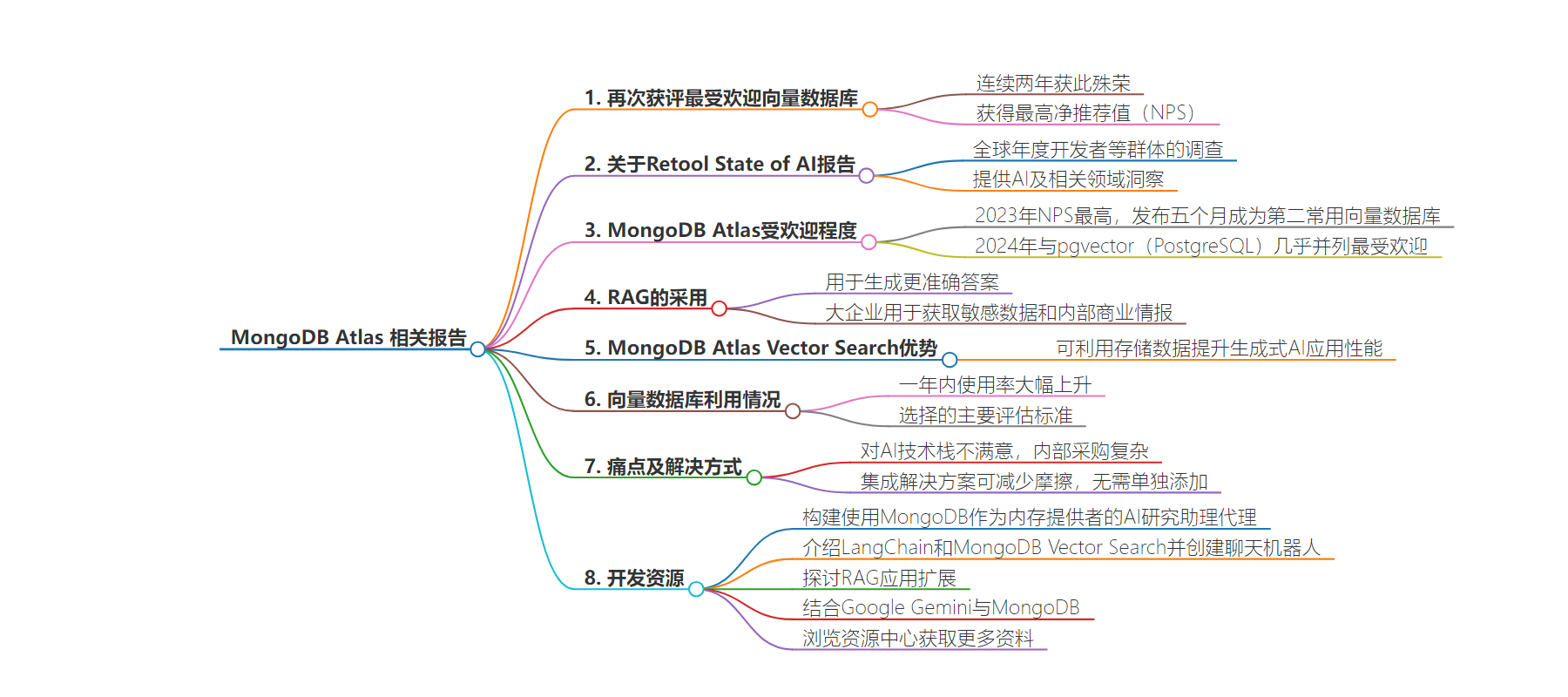包阅导读总结
1. 关键词:MongoDB Atlas、Vector Database、Retool 报告、RAG、AI
2. 总结:2024 年 Retool 报告显示,MongoDB Atlas 连续第二年被评为最受欢迎的向量数据库,其 Vector Search 获最高 NPS。报告还指出 RAG 采用率增加,而向量数据库使用大幅上升。调查反映了 AI 技术栈的困难,MongoDB Atlas 有优势,为开发者提供了相关资源。
3.
– MongoDB Atlas 连续两年在 Retool 报告中被评为最受欢迎的向量数据库
– 获最高净推荐值(NPS)
– 与 pgvector 几乎并列最受欢迎
– Retool 报告
– 全球年度对开发者等的调查
– 提供 AI 现状和未来包括向量数据库等方面的洞察
– RAG 采用增加
– 用于生成更准确回答
– 大企业用于获取时敏数据和内部商业智能
– 向量数据库使用大幅上升
– 2023 到 2024 从 20%升至 63.6%
– 选择的主要评估标准包括性能基准等
– 面临的问题
– AI 技术栈困难
– 内部采购复杂
– MongoDB Atlas 优势在于集成无需单独解决方案
– 为开发者提供的资源
– 如构建 AI 研究助手等的教程
思维导图:
文章来源:mongodb.com
作者:Rachelle Palmer
发布时间:2024/8/8 16:21
语言:英文
总字数:713字
预计阅读时间:3分钟
评分:86分
标签:人工智能,向量搜索,MongoDB,RAG,数据库
以下为原文内容
本内容来源于用户推荐转载,旨在分享知识与观点,如有侵权请联系删除 联系邮箱 media@ilingban.com
The 2024 Retool State of AI report has just been released, and for the second year in a row, MongoDB Atlas was named the most loved vector database. Atlas Vector Search received the highest net promoter score (NPS), a measure of how likely a user is to recommend a solution to their peers.
The Retool State of AI report is a global annual survey of developers, tech leaders, and IT decision-makers that provides insights into the current and future state of AI, including vector databases, retrieval-augmented generation (RAG), AI adoption, and challenges innovating with AI.
MongoDB Atlas commanded the highest NPS in Retool’s inaugural 2023 report, and it was the second most widely used vector database within just five months of its release. This year, MongoDB came in a virtual tie for the most popular vector database, with 21.1% of the vote, just a hair behind pgvector (PostgreSQL), which received 21.3%.
The survey also points to the increasing adoption of RAG as the preferred approach for generating more accurate answers with up-to-date and relevant context that large language models (LLMs) aren’t trained on. Although LLMs are trained on huge corpuses of data, not all of that data is up to date, nor does it reflect proprietary data. And in those areas where blindspots exist, LLMs are notorious for confidently providing inaccurate “hallucinations.” Fine-tuning is one way to customize the data that LLMs are trained on, and 29.3% of Retool survey respondents leverage this approach. But among enterprises with more than 5,000 employees, one-third now leverage RAG for accessing time-sensitive data (such as stock market prices) and internal business intelligence, like customer and transaction histories.
This is where MongoDB Atlas Vector Search truly shines. Customers can easily utilize their stored data in MongoDB to augment and dramatically improve the performance of their generative AI applications, during both the training and evaluation phases.
In the course of one year, vector database utilization among Retool survey respondents rose dramatically, from 20% in 2023 to an eye-popping 63.6% in 2024. Respondents reported that their primary evaluation criteria for choosing a vector database were performance benchmarks (40%), community feedback (39.3%), and proof-of-concept experiments (38%).
One of the pain points the report clearly highlights is difficulty with the AI tech stack. More than 50% indicated they were either somewhat satisfied, not very satisfied, or not at all satisfied with their AI stack. Respondents also reported difficulty getting internal buy-in, which is often complicated by procurement efforts when a new solution needs to be onboarded. One way to reduce much of this friction is through an integrated suite of solutions that streamlines the tech stack and eliminates the need to onboard multiple unknown vendors. Vector search is a native feature of MongoDB’s developer data platform, Atlas, so there’s no need to bolt on a standalone solution. If you’re already using MongoDB Atlas, creating AI-powered experiences involves little more than adding vector data into your existing data collections in Atlas.
If you’re a developer and want to start using Atlas Vector Search to start building generative AI-powered apps, we have several helpful resources:
-
Learn how to build an AI research assistant agent that uses MongoDB as the memory provider, Fireworks AI for function calling, and LangChain for integrating and managing conversational components.
-
Get an introduction to LangChain and MongoDB Vector Search and learn to create your own chatbot that can read lengthy documents and provide insightful answers to complex queries.
-
Watch Sachin Smotra of Dataworkz as he delves into the intricacies of scaling RAG (retrieval-augmented generation) applications.
-
Read our tutorial that shows you how to combine Google Gemini’s advanced natural language processing with MongoDB, facilitated by Vertex AI Extensions to enhance the accessibility and usability of your database.
-
Browse our Resources Hub for articles, analyst reports, case studies, white papers, and more.
